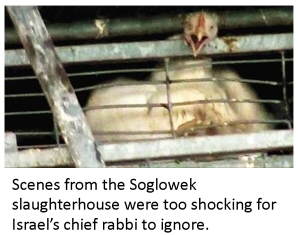The Beet-Eating Heeb –
From their perch in America, many Diaspora Jews look at the Orthodox Rabbinate in Israel as a bunch of Neanderthals who use clubs to beat back any modern innovation or progressive idea.
No offense to any Neanderthals.
But The Beet-Eating Heeb, for one, might have to revise his assessment of Israel’s Rabbinical leadership.
On one issue that is near and dear to BEH’s heart, and probably to yours as well, the newly elected Chief Ashkenazi Rabbi of Israel recently made a very enlightened statement. And BEH is all for giving credit where credit is due.
Chief Rabbi Lau, after viewing televised footage of horrific abuses of animals at (yet another) kosher slaughterhouse, issued an unusually strong statement of condemnation.
His statement came in response to seeing chickens packed in filthy cages without food or water, writhing turkeys tossed into metal boxes with their throats cut, and several other forms of cruelty at a Soglowek slaughterhouse in Northern Israel.
“As a human being and as a Jew, I was shocked by the footage, by the brutal behavior of those employees toward helpless animals,” said Lau, according to Israel’s Ynet website. “Such things shouldn’t happen. The Torah forbids us to act in this way and obliges us to be extra vigilant with regard to animal welfare. We cannot remain silent in the face of such things. We will act firmly and sternly against this factory.”
The slaughterhouse, after a brief closure, has reopened. It remains to be seen whether Soglowek will improve its practices.
Nonetheless, Lau’s tough talk heartened The Beet-Eating Heeb for two reasons.
The rabbi specifically invoked “tzar baalei chaim,” the Jewish prohibition on inflicting unnecessary suffering on animals. He acknowledged the reality that the laws of kosher slaughter only apply to the last seconds of an animal’s life. What happens in the modern factory farm and during transport to the slaughterhouse typically involves multiple forms of cruelty, but is not governed by kashrut.
Second, Lau’s response to the Soglowek scandal stands out in vivid contrast to how America’s kashrut establishment has reacted to similar situations in U.S. slaughterhouses.
 The most obvious example is the infamous Agriprocessors case, in which undercover investigators from 2004-2008 documented shocking cruelty at what was then the world’s largest glatt-kosher slaughterhouse. In response, the Orthodox Union, the country’s largest kosher-certification agency, repeatedly denied that anything was amiss.
The most obvious example is the infamous Agriprocessors case, in which undercover investigators from 2004-2008 documented shocking cruelty at what was then the world’s largest glatt-kosher slaughterhouse. In response, the Orthodox Union, the country’s largest kosher-certification agency, repeatedly denied that anything was amiss.
Indeed, the Orthodox Union engaged in a public-relations campaign on behalf of Agriprocessors, essentially telling kosher consumers, and veterinary experts, not to believe what they were seeing with their own eyes.
Don’t take The Beet-Eating Heeb’s word for it, although you certainly can. Documentary evidence of the OU’s shenanigans can be found in the archives of the OU’s own Website.
Why would Orthodox rabbis bend over backwards to defend the perpetrators of cruelty?
BEH can answer in one word: Money.
The OU is the United States’ largest certifier of kosher products. It’s a very big business. The amount of money that the OU collects from kosher certification is not available on Guidestar, but suffice it to say, the total amount has quite a few zeros.
Agriprocessors was the sordid intersection of the country’s largest slaughterhouse and largest kosher certifier. Compassion, ethics, and concern for animals didn’t stand much of a chance. Neither did Judaism or Jewish values, for that matter.
Mark BEH’s words. There will be another Agriprocessors. There will be another videotaped, well-documented case of heart-wrenching, stomach-turning cruelty at a large American kosher slaughterhouse.
After all, kosher slaughter in the modern, factory-farming era resembles an assembly line. Make that a disassembly line. The point is, the sheer volume of animals, and the rapid line speed of the slaughter, all but ensures that cruelty will occur.
We can only hope that next time, America’s Orthodox rabbinate will not sacrifice compassion on the altar of economic expediency.
![]()
(c) The Beet-Eating Heeb – Read entire story here.









